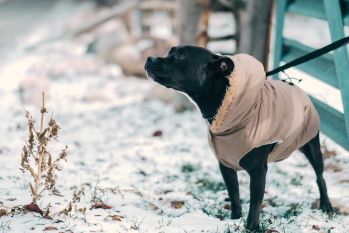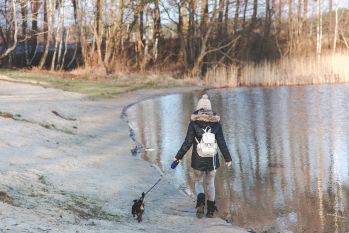We’re lucky here in Virginia to have plenty of winter activities you can enjoy with your pet, from enjoying the outdoors to cozy evenings by a crackling fire. Knowing that winter weather may also be hazardous, we’ve compiled a few tips to help you keep your pet healthy and comfortable.
Winter Walks
- After a walk, wash and dry your pet’s feet and stomach to remove salt and deicing chemicals, as well as any snow or ice. Petroleum jelly or booties can be helpful in protecting sensitive paws.
- In extreme cold, don’t linger outside. Instead, keep your pets mentally stimulated indoors with games. Hide treats around the house for a treasure hunt; use interactive toys for dogs and cats. This is a perfect opportunity to work on your training commands.
- Signs of hypothermia include whining, shivering, anxiety, slowing or stopping, weakness, and burrowing. If your pet exhibits these symptoms, move them inside to a warm place quickly and contact your primary care veterinarian. Frostbite typically affects extremities such as ear tips, paws, and tail ends, and might not show visible signs for a few days.

Winter Health
- Remember that older pets and those with certain conditions such as diabetes, heart disease, kidney disease, or hormone imbalances can have a harder time regulating their body temperature and keeping warm. Make sure they are kept comfortable and cozy.
- Cold weather can also worsen arthritis. Make sure your pets sleep in a warm place off the floor and away from drafts, and take particular care with arthritic seniors.
- Even though dogs and cats have fur, that doesn’t necessarily keep them warm in cold weather. Jackets and sweaters are great for keeping dogs warm outside. It is important to never shave a long-haired dog in winter.

Winter Hazards
- Never let your pet off leash near a frozen body of water. Dogs that chase or wander onto the ice can fall through. Even in freezing weather, ice can be surprisingly thin. Don’t risk it.
- Antifreeze is deadly to pets and they love the sweet taste, so clean up spills immediately.
- Use space heaters with caution as they are easily knocked over by pets and can cause fire or burns.
- Always bang on the hood before you start your car to scare away any cats or other critters that might be seeking warmth in your engine compartment.
- Cars act like refrigerators in the winter and exacerbate already cold conditions. Leaving your pet in a car on a cold day can cause them to freeze to death.

Winter Emergencies
- Winter can bring blizzards, windstorms, and power outages. Always be prepared and include your pet in your family emergency plans. Make sure to have enough pet food, medication, and fresh water to last at least five days.
- The same goes for your car winter emergency kit–include supplies for your pet if they are traveling with you.

We hope these tips help you and your pet have a safe, healthy, and fun-filled winter season. Remember, The COVE is open 24/7/365 days a year with a team of compassionate, highly skilled emergency clinicians if you need us.
About Us
The COVE’s veterinarians and staff wholeheartedly embrace the core values of community, collaboration, commitment, compassion, and integrity. This focus ensures that pets, the people who love them, and their primary care veterinarians have as positive and affirming a healthcare experience as possible, regardless of the circumstances that bring us all together.
